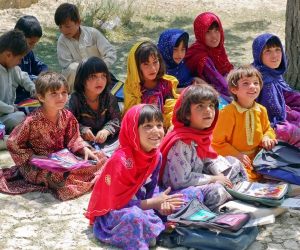
Pitt Education New Home Base for Prestigious International Society
Throughout the 1950s and 60s, governments in lower-income countries regularly sent their top students to universities in the United States to study how to build up their public education systems back home.
The University of Pittsburgh School of Education was at the forefront of these international development initiatives.
Prominent leaders at the ministry of education in South Korea, for example, received graduate degrees from Pitt Education. Progress in the country’s education system corresponded with an economic boom that produced global giants Samsung, LG, and Hyundai Motor Company.
The legacy of international education at Pitt Education has begun a new chapter. The school will serve as the new office of the Executive Director for the Comparative and International Education Society (CIES) following the recent appointment of faculty member M. Najeeb Shafiq as executive director. The appointment took effect on August 1, 2019.
“The University of Pittsburgh is one of the world’s premier institutions supporting our field, having produced numerous CIES presidents and leaders since the late 1950s,” said David Post, president of CIES and a faculty member at Penn State University, in the official announcement.
CIES is a global association for educators and practitioners whose professional work is built on cross-disciplinary ideas, systems, and practices in international education. The society has over 3,000 members around the world.
“Now we at the Pitt School of Education will once again become synonymous with the field of comparative and international education,” said Shafiq.
Since 2010, Shafiq has been a member of the Pitt Education faculty in the Department of Administrative and Policy Studies. His own life is a case study on the effects of international education. He was born in Bangladesh, completed high school in the United Arab Emirates, earned his bachelor’s degree at the University of Western Ontario in Canada, earned his master’s degree at the University at Buffalo in New York, and completed his doctorate at Columbia University in New York.
Prior to joining Pitt Education, Shafiq worked as an economist at the World Bank and Abt Associates Inc. and was a faculty member at Washington and Lee University and Indiana University in Bloomington.
As the new home institution of the CIES, Pitt Education is poised to have greater exposure to the study of global issues in education, Shafiq said.
The school is expected to host events with significant leaders in the field, including the World Bank, the Inter-American Development Bank, the Economic Policy Institute, the RAND Corporation, and the American Institutes for Research.
In addition, the school will host CIES board meetings that will bring top academic minds to campus. Pitt students, alumni, and faculty will have opportunities to interact with the policy and academic leaders.
“We will be at the forefront of where education policy around the world is headed. It really is an exciting time to be a Pitt Education student, alumnus, or faculty member,” said Shafiq.
The selection of Shafiq and Pitt Education was made possible due to the support of the school’s Office of the Dean, the University’s Center for International Studies (UCIS), and the Institute for International Studies in Education (IISE). Shafiq, in particular, credits Valerie Kinloch, Renée and Richard Goldman Dean of Pitt Education; Ariel Armony, the university’s Vice Provost for Global Affairs and Director of UCIS; and Maureen McClure, IISE Director and faculty member. .
Shafiq said that as the executive director of CIES, his top priority is to serve the membership base. He plans to focus his efforts on building an effective platform to match up job-seekers and employers.
“Job-seekers don’t always know where to look, and employers are overwhelmed by the number of schools with programs,” said Shafiq. “By listening to our members and learning from other organizations, we can find better ways of matching job-seekers and employers. In the end, societies win because talented people are able to do what they do best.”
With Shafiq at the helm, the future looks bright for CIES, and Pitt Education will again lead the way in the cross-cultural exchange of knowledge in international and global education.




